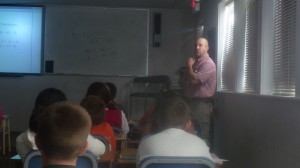Two years in, a school technology pilot program has run its course.
That’s the opinion of a State Board of Education subcommittee — which suggests seeing the $3 million in pilot money folded into statewide programs.

The State Board will consider the idea in September, along with other followup recommendations on education reform. The State Board’s decision on technology will come as 15 schools around the state launch $3 million in pilot projects, and weeks before an election that could mark a changing of the guard on K-12.
The recommendation to scrap the tech pilots comes from a subcommittee drilling down on the 20 far-reaching education reform recommendations from Gov. Butch Otter’s education task force. Several committees and subcommittees are working on followup — and this particular subcommittee is focused on innovation and collaboration — everything from teacher professional development to classroom technology.
“They felt like the pilot phase had been useful,” State Board spokeswoman Marilyn Whitney said, “but it was time to take the lessons learned.”
The subcommittee is adamant that the state needs to furnish a statewide system of broadband and wireless — not just in high schools, but in elementary and middle schools. Subcommittee members want trustees and administrators to decide what kind of technology works best locally, but they want to make sure the state provides all students with a high-tech learning environment, Whitney said.
“If they can’t connect, it doesn’t matter,” she said.
Scrubbing the tech pilot program wouldn’t affect the 26 tech pilot schools scattered around the state: The schools already have their cash in hand. The move could, theoretically, free up a modest $3 million for technology programs — if the state heeds the innovation and collaboration panel’s recommendation to make money available “to all districts for technology needs.”
Folding $3 million into a statewide initiative won’t go far: It would equate to roughly $11 for each student in the K-12 system. Outgoing State Superintendent Tom Luna has said the state may need a much more robust statewide investment, perhaps on the order of $200 per student.
Even distributed in lump sums — to fund schoolwide technology pilots — the $3 million a year hasn’t gone far. The second round of grants went to 15 schools, but 99 schools submitted $26 million in requests. In July 2013, Idaho funded 11 pilot programs — representing a fraction of the 81 applications submitted.
The innovation and collaboration subcommittee hasn’t settled on a dollar figure that would be needed to bankroll a statewide technology program. But the panel might yet do so, Whitney said.
In that sense, the subcommittee is following the lead of Otter’s task force. When the task force finished its work a year ago, it recommended providing devices across the school system — but was silent on the particulars and the costs.
Even after the State Board makes its tech pilot recommendation in September, the fate of technology in the schools will rest in the hands of November’s election winners.
Luna will propose a K-12 budget for 2015-16, which may include requests for technology funding. But his successor, Republican candidate Sherri Ybarra or Democratic candidate Jana Jones, will have a chance to fine tune the K-12 budget request, including any technology line item. The winner in the gubernatorial race will submit a budget request at the start of the 2015 legislative session – the governor’s post, and all 105 legislative seats, are up for grabs on Nov. 4.
More coverage: Read about three Treasure Valley tech pilot schools, and watch a video segment from our broadcast partners, KIVI and KNIN.
